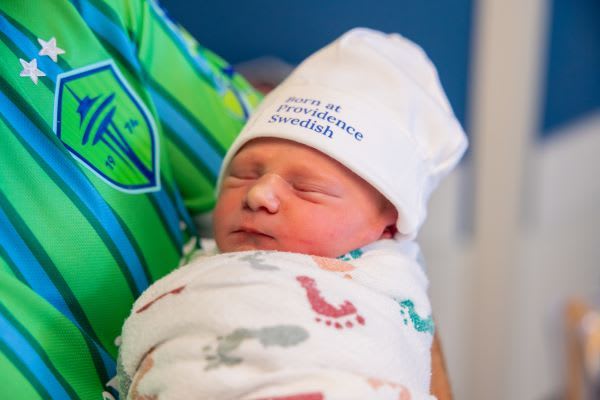Call 833-923-3555 or fill out the form to schedule an appointment.
Pregnancy and Childbirth
Every year more babies are born at Swedish than at any other health system in Western Washington.
Helping you have your baby your way is one reason so many families choose Swedish. So is the peace of mind that comes from giving birth at a place with so many years of experience. While most births happen without a hitch, Swedish has teams of experts who care for those with difficult pregnancies, as well as newborns who need extra medical attention. We’d love to help you as you begin the journey of a lifetime.
Maternity Services and Amenities
At Swedish, we provide comprehensive care with OB/GYN, midwifery, and doula services, ensuring personalized support throughout your journey. With thoughtfully designed delivery rooms, neonatal intensive care units, and a team of specialists, we are equipped to meet the needs of every family, including those with high-risk pregnancies.
Our birth centers offer:
- OBGYN, midwifery and doula services
- Perinatologists specialized in high-risk obstetrics
- TeamBirth
- Nitrous oxide
- Neonatal intensive care units (NICU) staffed with board-certified pediatric specialists
- Lactation consultants
- Thoughtfully designed and comfortable delivery rooms
- Private bathrooms and bathtubs
- Labor support tools and aromatherapy
- Newborn photography
Patient Story
Experience the journey of Seattle Sounders FC's Jesús Ferreira and his family at Providence Swedish, highlighting exceptional care from doctors and nurses, comfortable hospital stays, and positive follow-up appointments.

Your Education Guide to Pregnancy, Birth and Parenting
Learn more about changes that you can expect during pregnancy, labor and beyond. From prenatal care to breastfeeding to early parenthood, let our free eBook be your guide.
Available to read in both English and Spanish, your maternity care team will reference it as they accompany you on your pregnancy journey.
Maternity Resources for Pregnancy and Birth

Hear from an expert educator, take part in hands-on activities, and most of all, ask questions.

Get information on where to give birth, who to choose as your provider, childbirth and parenting classes, whether genetic testing is right for your family, and more.

To help you get ready for the big event, we have lots of good information about all things labor and delivery, including doula services.

Swedish offers lactation support, breastfeeding and chestfeeding classes and milk donation.
Providers Specializing in Pregnancy and Childbirth
At Swedish, you'll have access to a vast network of dedicated and compassionate providers who offer personalized care by focusing on treatment, prevention and health education.
What’s it really like to have a baby at Swedish?
News & Information From Our Experts
Get the latest news, important information and updates from Swedish experts.




